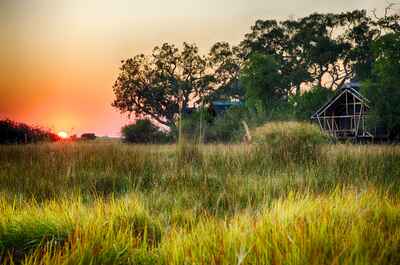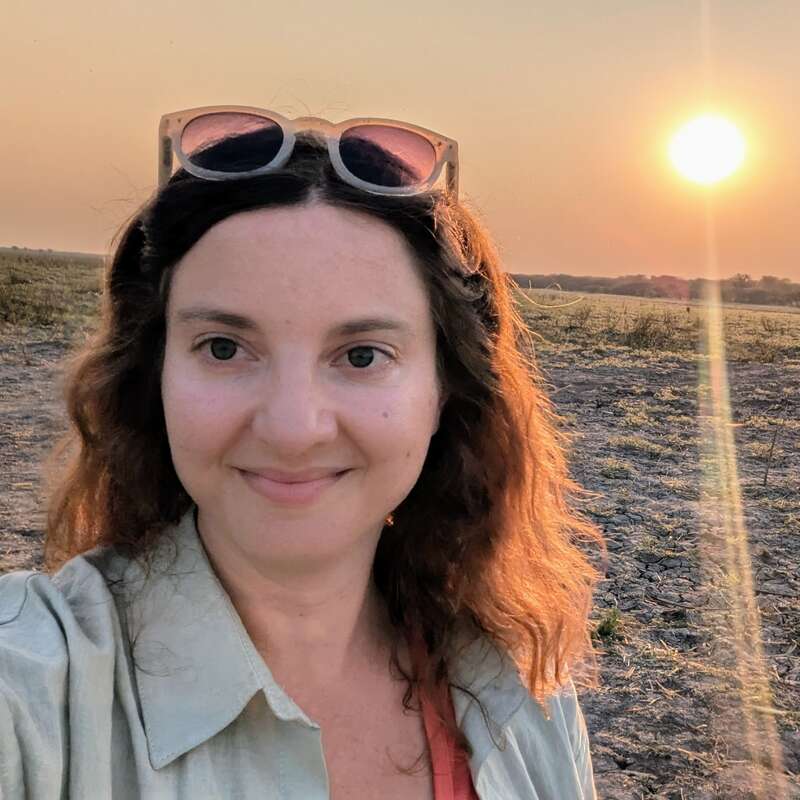About Lebala Camp
Wild dogs are one of the most sought-after safari sightings, with Lebala one of the best places to spot them.
In the south of the vast private Kwando Reserve, Lebala lies on the edge of the Linyanti Marshes, looking out as far as the eye can see over wetland and grassy floodplains. Lion, leopard and cheetah roam the plains, and wild dogs have denned here for more than two decades.
Scaling back, a small footbridge crosses a lily-filled channel to camp, where all is calm and orderly. Sandy pathways lead to huge tented chalets, with views over the plains. Watch out for wildlife from the wooden balcony or inside – from the bed or comfy chairs – through floor-to-ceiling mesh windows and sliding doors.
In the heat of the day, help yourself to a cooling drink from the fridge in the lounge, then retreat to the shady viewing deck and check out the birdlife. Or make your way to the plunge pool – where you can still keep an eye on the plains, of course.
As night falls, a decadent bath may appeal, or a shower under the stars, before mulling over the day’s adventures around the firepit. With dinner around a big communal table, the day is complete.
Our view
We have visited Lebala Camp very regularly over the years and its laid-back style hasn't changed, even though the camp's fabric has been upgraded. The accommodation is good, and the Kwando Reserve has excellent wildlife, especially during the dry season. Most visitors come wanting the single-minded focus behind its activities, and the great sightings of wild dogs, cheetah and lion that it often delivers. However, a few find that this blinkered approach detracts from a wider appreciation, and regret that there's no time for observing the area's less iconic species.
Accommodation
8 chalets, 1 family
Children
Best for 12+
Open
All year
Activities

4WD Safari

Birdwatching

Guided walking safari

Helicopter

Night drive

Private activities
Traveller reviews of Lebala Camp
205 real, un-edited reviews from Expert Africa's travellers.
Arrived 19 May 2025, 3 nights
"Lebala Camp review"
Overall rating: Excellent
Arrived 1 Nov 2024, 3 nights
"Lebala Camp review. "
Overall rating: Excellent
Arrived 24 Oct 2024, 4 nights
"Lebala Camp review"
Overall rating: Excellent
Arrived 20 Oct 2024, 2 nights
"Lebala Camp review"
Overall rating: Excellent
Arrived 25 Jun 2024, 2 nights
"Lebala Camp review"
Overall rating: Good
Arrived 25 Jun 2024, 3 nights
"Lions, elephants, and much more!"
Overall rating: Excellent
Arrived 21 Jun 2024, 4 nights
"Lebala Camp review"
Overall rating: Excellent
Arrived 12 Jun 2024, 2 nights
"Views of the Plains rather than water"
Overall rating: Excellent
Arrived 3 Jun 2024, 3 nights
"Lebala Camp review"
Overall rating: Excellent
Arrived 16 May 2024, 3 nights
"Lebala Camp review"
Overall rating: Excellent
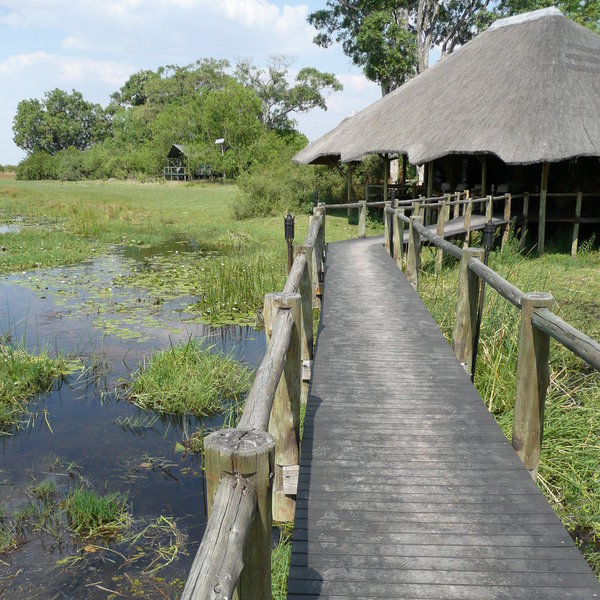
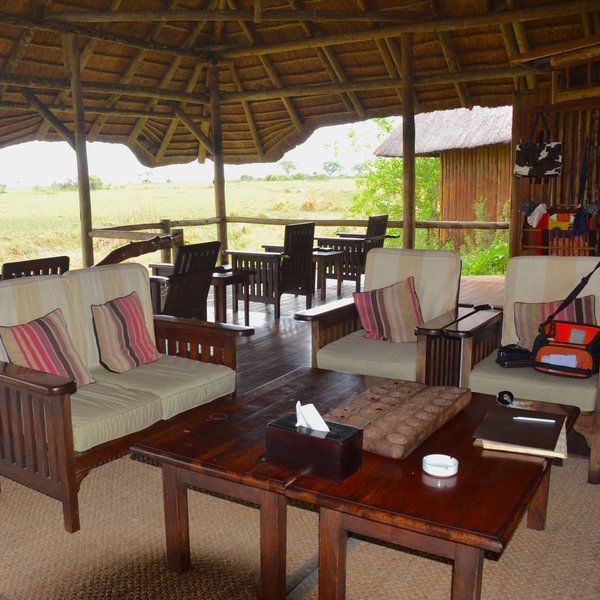
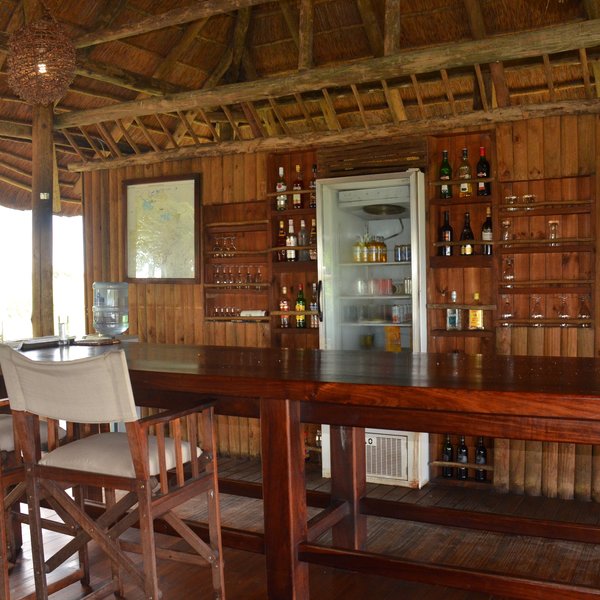

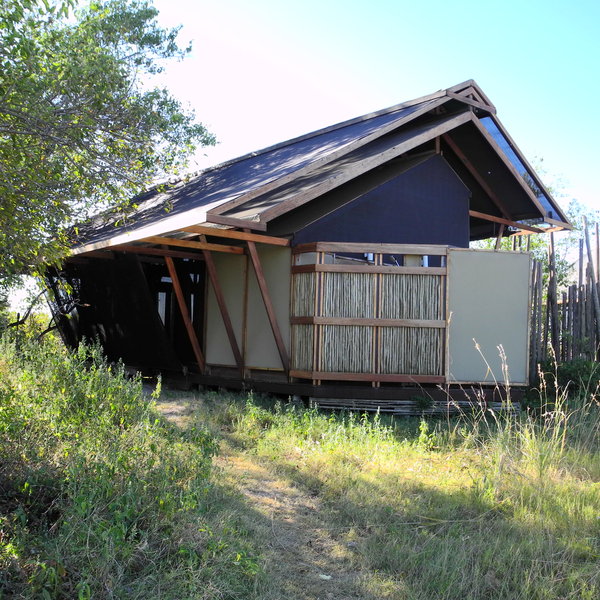
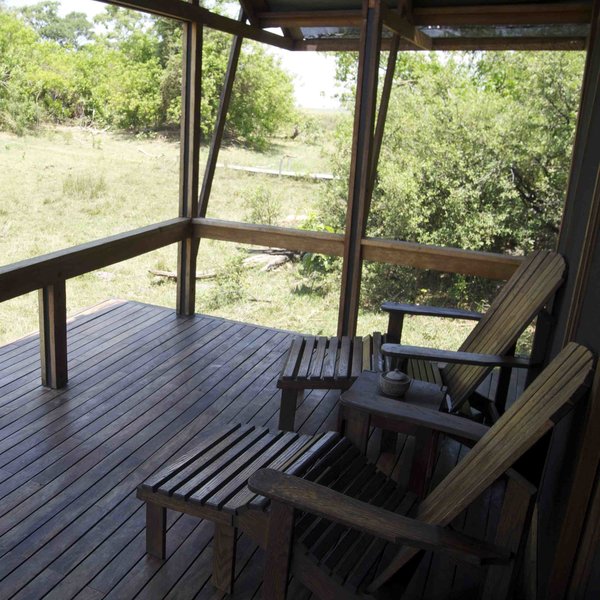
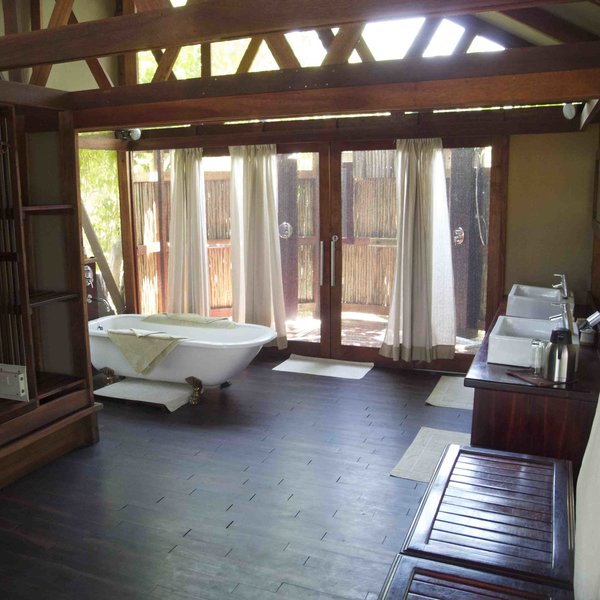

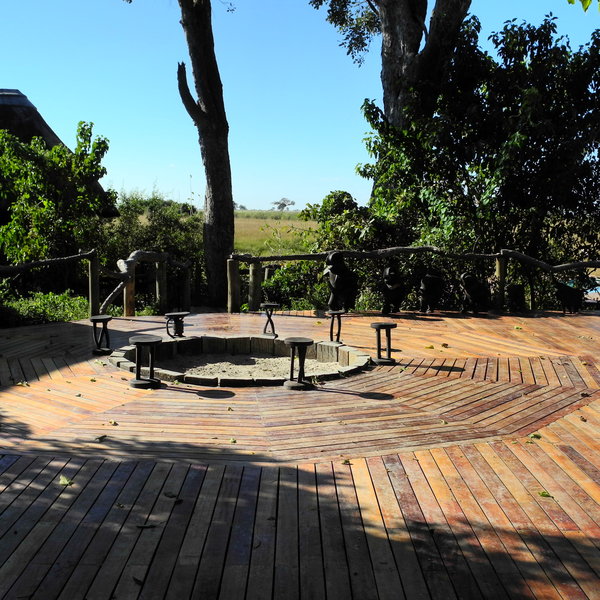
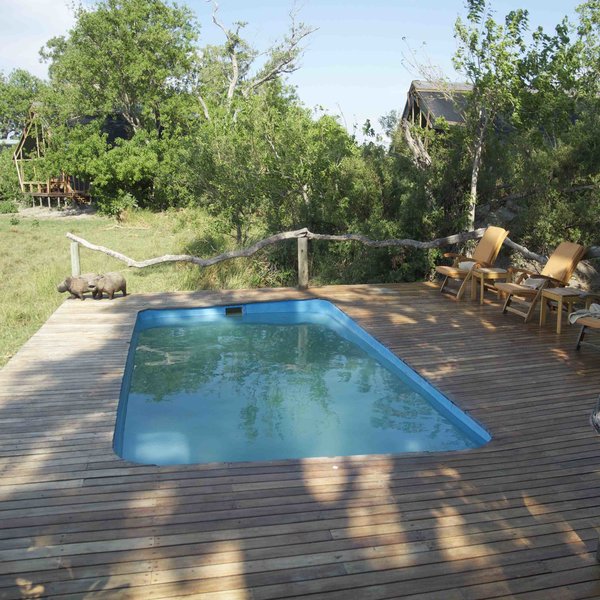
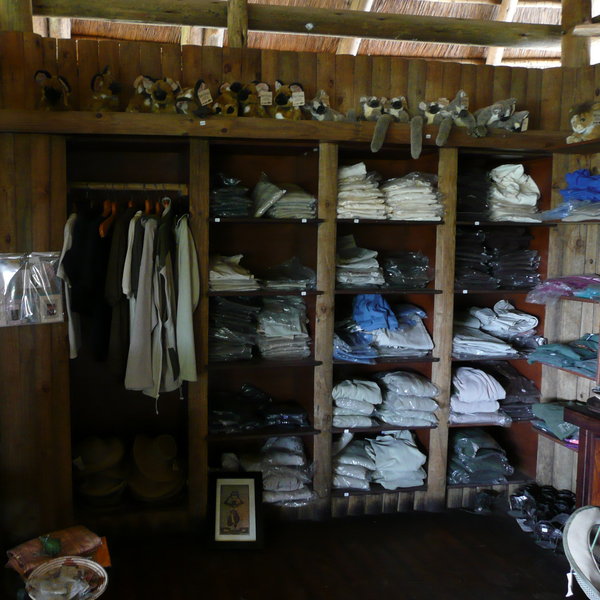
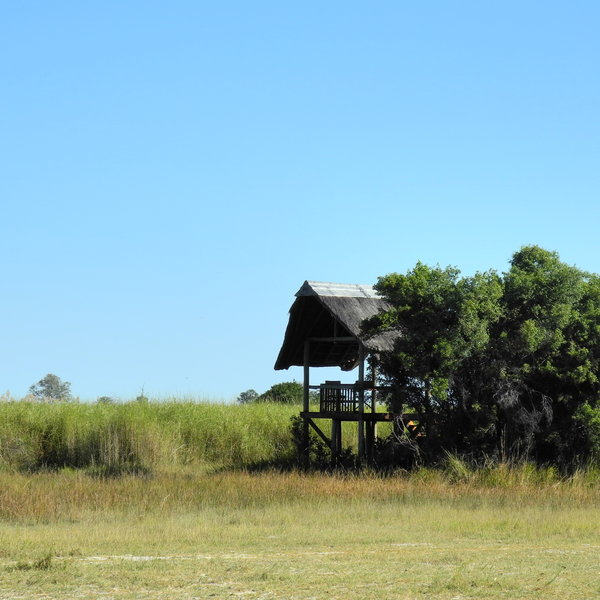

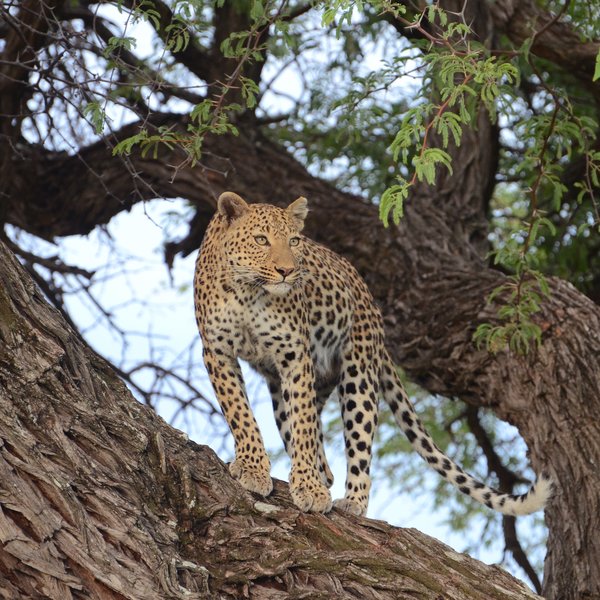
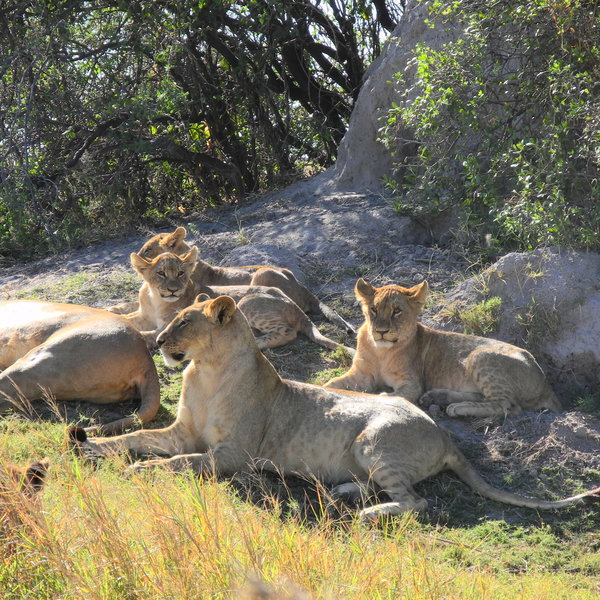
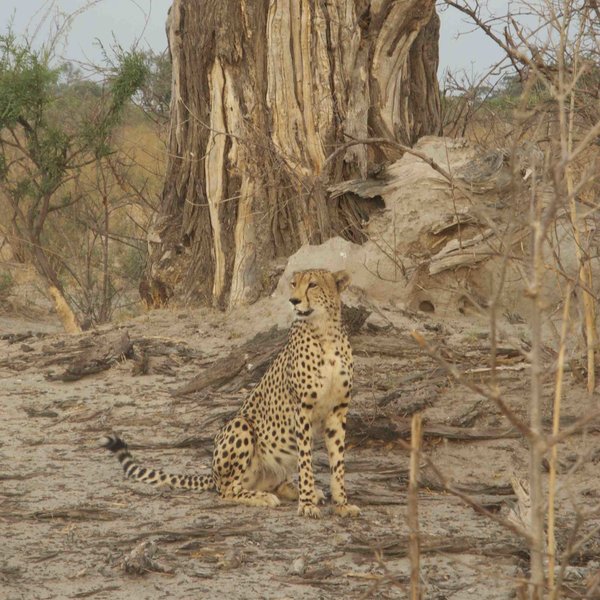
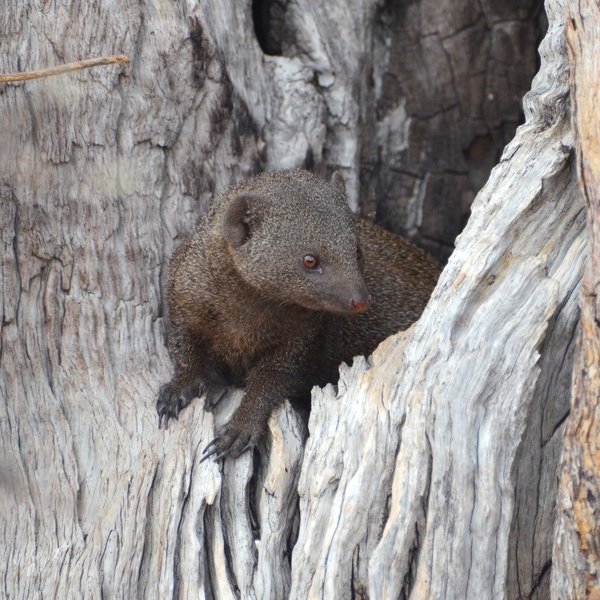
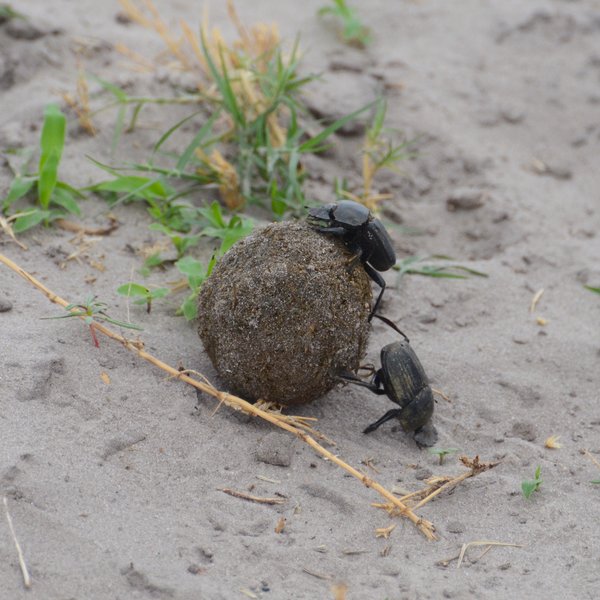
Expert Africa's gallery
When we travel we take lots of photos ourselves to give you a real and un-edited view of the safaris. See our 35 pictures of Lebala Camp to get the candid view.
View gallerySafaris visiting Lebala Camp
Just ideas, we'll always tailor-make a trip for you
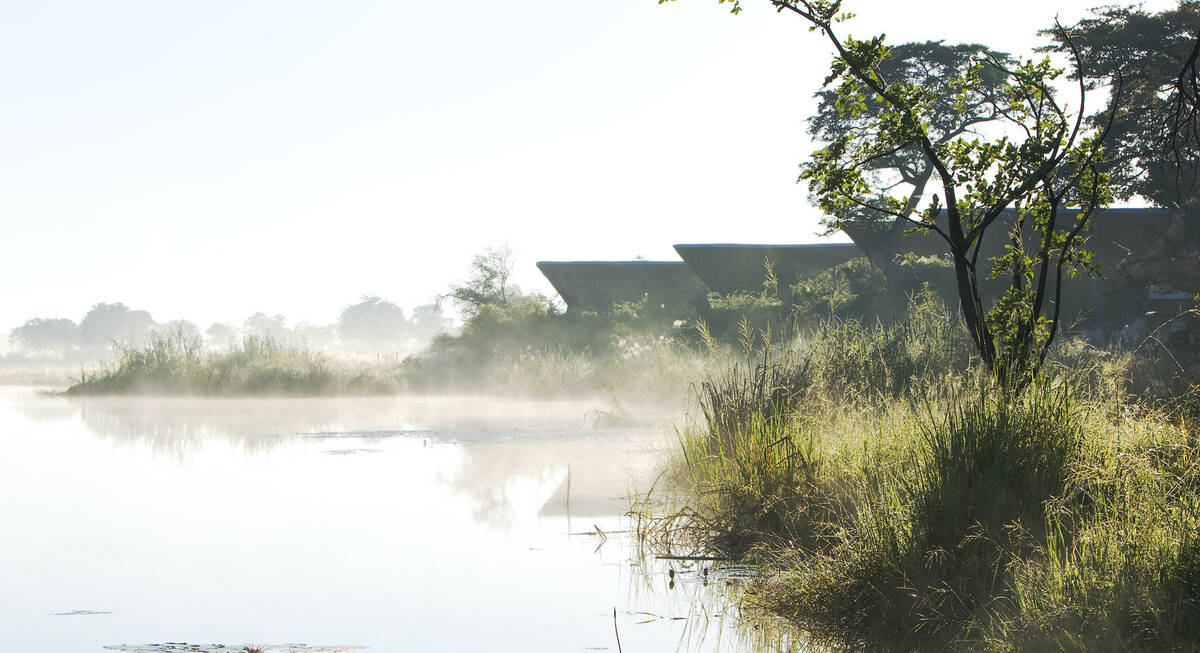
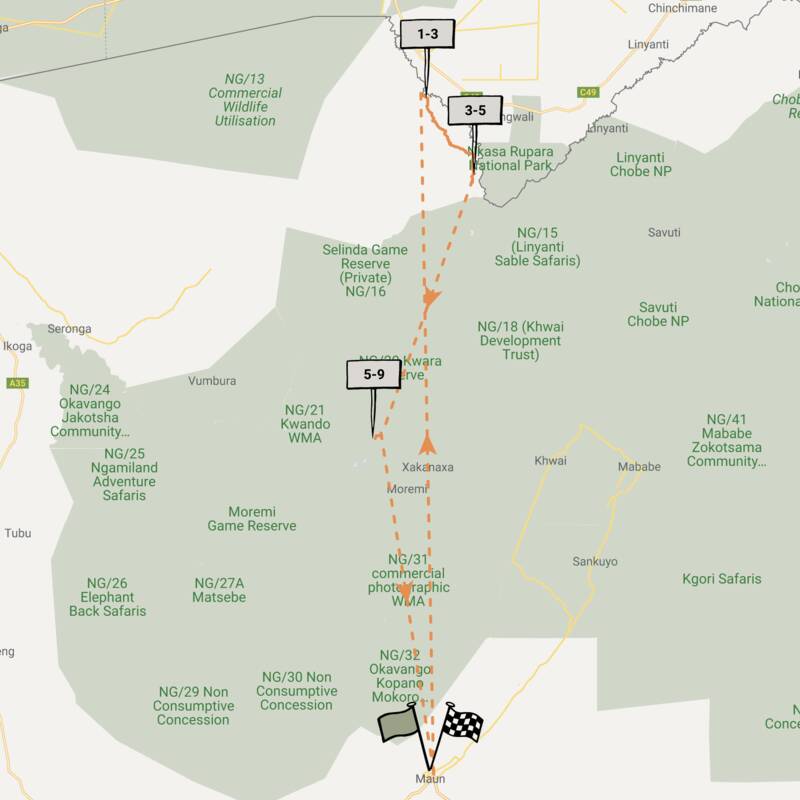
Pangolin Safari
8 days • 3 locations • 1 country
MAUN AIRPORT TO MAUN AIRPORT
Three relaxed, local feeling camps in pristine settings – the Kwando Reserve and Okavango Delta. Guided by a driver and tracker at each, this a great trip for spotting Botswana’s top predators.
Visiting Okavango Delta, Kwando-Linyanti
US$9,730 - US$16,340 per person
Lebala Camp: Our full report
In the extreme north of Botswana, Lebala Camp stands in the lush, open grasslands of the vast Kwando Reserve.
This private reserve is a largely dry wildlife area with a reputation as a top African safari destination for big game – focusing especially on the predators.
Lebala shares the Kwando Reserve with its sister camp, Lagoon Camp, which lies beside the Kwando River to the north. The reserve itself, made up of mopane forests, lush riverine forest and open floodplains covering roughly 2,300km², attracts superb big game – including elephant and buffalo – with numbers swelling significantly (especially in its riverine areas) during the dry season, between June and October. Wild dogs have also regularly denned in the Kwando concession since 1997.
The combination of excellent wildlife densities and a strong policy of actively tracking the predators has given this area a well-earned reputation as offering one of the best chances of seeing wild dogs, especially during the denning season (June–July). Of course, like every wild place, nothing is guaranteed though!
Lebala Camp, in the south of the reserve, is reached by a small footbridge over a lily-filled waterway, opening into a large lounge and bar area scattered with chairs and sofas. The free-standing bar, with a “help-yourself” drinks fridge, is well stocked and is usually where afternoon tea is served. The firepit is central to morning and evening life in this camp; it's where morning tea and coffee are taken before the activities start and it's usually where travellers gather to discuss the events of the day before dinner.
For those hot days, there is a small plunge pool with very pleasing views over the plains. There is also a small but well-stocked gift shop, too, where we’re pleased to see a good number of locally made items on sale.
Behind both the communal buildings and tented chalets is a separate, shady viewing deck, raised up high and with views over the wetlands. This is an ideal spot to retreat for solitude and to try a spot of birding – or, if the reeds are short, to see what animals pass by.
Lebala's eight enormous tented chalets – including one two-bedroom family chalet – stand on the edge of the Linyanti Marshes, with views over the waterway and grassy plains beyond. Set up on wooden decks, the chalets are joined to the main area by sandy pathways. Each has a balcony with a couple of wooden deckchairs, as well as a small sitting area inside.
You enter the room from the balcony, through sliding meshed doors; in fact most of the chalet's canvas walls incorporate floor-to-ceiling mesh. This allows for welcome cooling breezes in summer but can make the room quite cold in winter, as well as compromising on privacy. However, privacy – and a little extra warmth – can more or less be maintained by drawing the white curtains that are hung around almost the whole room. For extra warmth, spare blankets are kept in a trunk in the room, while for the hotter months there is a ceiling fan above the bed.
To the front of the chalet is the bedroom and lounge area, where twin three-quarter-size beds (which can be converted to a double) face the front, overlooking seasonal floodplains. The chalets are large and comfortable, with dark wood fixtures: nicely decorated without being overly stylish.
A canvas wall divides the bedroom from the bathroom and dressing area, which features a lovely claw-footed bath, as well as twin washbasins and a separate cubicle with flushing toilet. (A tip from our team: we found that because of the solar hot-water heaters, the water is usually hottest during the day – although we still enjoyed a good, reasonably hot bath after dinner one evening.) There are large shelves and a hanging space for clothes, and a small safe to store valuables. Another set of sliding doors leads to an outside double shower. A range of toiletries is supplied, as are insect repellent and insect spray.
Lebala's family chalet is similar to the others, but has a second, smaller twin-bedded room accessed from the bathroom – which is shared by both bedrooms.
The main activities at Lebala Camp focus on day and night 4WD game drives, accompanied by both a qualified guide/driver and a tracker. This not only enhances the guide's ability to track predators and more elusive game, but also affords an extra pair of experienced eyes for spotting wildlife – especially in thicker bush.
The Land Cruiser vehicles at Lebala take a maximum of six guests on the three rows of seats – so everyone gets a “window” seat.
The guides at Lebala are professional, friendly and especially enthusiastic about tracking predators. On our last visit, in November 2019, we spent most of our morning drive tracking a pair of male cheetahs. After two hours following their spoor, and being interrupted by a pack of wild dogs, we finally found the cheetah resting under a small tree. We were also incredibly lucky to spot some of the smaller, less common predators, including a pair of honey badgers, and enjoyed a wonderful sighting of a mother aardwolf and her pups. On previous visits we have also encountered leopard and lion on a fairly regular basis.
Historically wild dogs have tended to den closer to Lagoon Camp in this concession, where teams from Expert Africa have been lucky enough to follow them hunting on past visits. However in recent years they have been more unpredictable and for the last decade have denned either between Lebala and Lagoon or near to one or the other.
This single-minded focus on predators is often very positive, especially given that many visitors come specifically for predator sightings. However, more relaxed safari goers – who perhaps have a wider interest in wildlife both great and small, or may be keen on birds – have sometimes found the relentless “gung-ho” approach a bit too narrow, and may even be annoyed by the apparent exclusion of other interesting sightings. That said, on one of our visits our guide was also very enthusiastic about birds and was more than willing to stop on request – even while tracking predators – to answer questions regarding the birds or smaller wildlife we saw along the way.
Depending on the season, Lebala will sometimes also offer short walks. This is always at the guides' discretion, and is never guaranteed to be available; for example, there are sometimes simply too many elephant in this area to make walking safaris safe, or the grass may be too long, making it difficult to spot dangerous wildlife.
It is worth noting that although game sightings in the Kwando Reserve are more prolific during Botswana's dry season, between about June and October, rewarding sightings do occur year round. Indeed, the rainy season often reveals more unusual sights (particularly predators hunting), as well as a greater variety of birdlife.
Activities
4WD Safari
Birdwatching
Guided walking safari
Helicopter
Night drive
Private activities
Families & children
- Attitude towards children
- Lebala Camp has a positive approach to children on safari and welcomes children aged six and over. However, families with children aged 6–12 years are required to book a private vehicle on game drives. Depending on the size of the family group, there may be an additional charge for this vehicle.
Children younger than six may be accepted, but only if the entire camp is reserved for exclusive use.
- Property’s age restrictions
- Minimum age six years
- Equipment
- Lebala has a family chalet, but no special equipment is available. The camp will be flexible as possible with children's mealtimes and will prepare favourites such as spaghetti bolognese for children.
Guests travelling with children may book a “family safari” (at extra cost), with the family then allocated a private guide and tracker. Activities for children, both on game drives and back at camp, will be geared towards learning about the wilderness with activities such as spoor identification and tracking. - Generally recommended for children
- We recommend Lebala for older children, who are genuinely interested in wildlife. For families with younger children, we suggest a specialist family safari.
- Notes
- Lebala is unfenced, and dangerous wildlife, including lion and leopard, can wander through the camp at any time. There is no fence around the pool. Thus all children will need to be constantly supervised by their parents.
Food & drink
- Usual board basis
- Full Board & Activities
- Food quality
- In the past the quality of food at Lebala has been inconsistent, but on our last two trips, in September 2018 and November 2019, our meals were good: not haute cuisine, but definitely hearty!
An early breakfast of porridge or cereal, muffins, tea and coffee is taken around the campfire before the morning game drive.
Brunch is served on return from the morning activity. Most recently our choices included spanakopita (Greek spinach and feta pie), bacon and green bean pasta salad, a green salad, freshly baked bread, toast, and eggs cooked to order. A cheeseboard and biscuits and fresh fruit and yoghurt were also offered to round off the meal.
Afternoon tea is served just before the late afternoon activity, usually in the lounge. On different visits we've enjoyed roast vegetable wraps, sausage rolls, spinach and goat's cheese quiche, orange cake, carrot cake and melt-in-your-mouth custard biscuits, along with tea, coffee, homemade lemonade and iced tea.
A three-course dinner is served when you get back from your afternoon game drive. Our starter was deep-fried halloumi drenched in a delicious lime and caper sauce. This was followed by melt-in-your-mouth beef bourgignon served with baby potatoes, carrots, and courgettes fried with garlic. The vegetarian option was a tasty stuffed butternut squash. Dessert, though, was fairly underwhelming: a deep-fried banana dressed with coconut cream.
Occasionally there may be a traditional bush dinner, with singing by the staff. - Dining style
- Group Meals
- Dining locations
- Indoor and Outdoor Dining
- Further dining info, including room service
- There is no room service at Lebala.
- Drinks included
- Bottled water, soft drinks, local beers and spirits and a limited selection of (usually) South African red and white wines are included. Champagne and imported wines and spirits cost extra and may need to be requested in advance.
On arrival, guests are usually given a bottle of filtered water, which they are encouraged to top up from the filtered supply in the main area. Each room is provided with glasses and a flask of drinking water, which is replenished daily. We don't recommend that travellers drink from the tap.
Our travellers’ wildlife sightings from Lebala Camp
Since mid-2018, many of our travellers who stayed at Lebala Camp have kindly recorded their wildlife sightings and shared them with us. The results are below. Click an animal to see more, and here to see more on our methodology.

100% success

100% success

100% success

98% success

98% success

93% success

70% success

56% success

50% success

40% success

32% success

32% success

26% success

15% success

3% success

0% success
Getting there
- Location
- Kwando-Linyanti area, Botswana
- Ideal length of stay
- We recommend a stay of three nights at Lebala. The camp is popularly combined with one of its sister camps: in the Okavango, Kwara ; and in the drier reaches of the Kalahari, >Nxai Pan Camp or Tau Pan Camp. Sometimes Lebala also works well in combination with its nearby sister camp, Lagoon, also on the Kwando Reserve.
If you spend a total of six or more nights at Lebala in combination with one, or more, of its sister camps, there is a special offer and a saving to be made. We'll automatically include this for our travellers, but please do ask us for the details. - Directions
- Visitors arrive by light aircraft, followed by a 20-minute 4WD transfer from the airstrip to camp. When combining a stay at Lagoon and Lebala, transfers are usually by road as part of a morning game drive.
- Accessible by
- Fly-and-Transfer
Special interests
- Birdwatching safaris
- Situated in the huge, remote Kwando Concession of the Linyanti, Lebala Camp has access to mopane forests, lush riverine forest and open floodplains attracting an incredible range of bird species. Raptors such as eagles and vultures thrive here.
- See ideas for Birdwatching safaris in Botswana
Sustainability

Lebala: Engaging locals in educating tourists
Comprising of eight custom designed tents located in the Kwando Reserve’s 232,000 hectares of private unfenced wilderness, one of Lebala Camp’s biggest strengths is supporting people’s education, including both staff and guests.
For staff, the camp hires exclusively local people in all guest-facing roles, with citizens making up 98% of the staff. Moreover, the camp offers, apart from top-of-the-industry pay scales, merit and long service awards, many opportunities for advancement. By empowering its employees to achieve their potential, waiters advanced to become receptionists, and people who started out as trackers are now guides.
To educate tourists, Lebala operates each game drive using a local guide and a tracker. This adds to the experience on two levels. With the tracker concentrating solely on guiding, the guide is fully focused on imparting interesting information and bush folklore to tourists, keeping them informed and answering all their questions, thus leading to a more relaxed and authentic game drive atmosphere. Additionally, if travelling with kids, guests are given a personalised itinerary in order to not only entertain the children, but also educate them. Depending on their ages and interests, children can get involved in tasks such as preparing snacks for game drives with the chefs, make greeting cards out of natural materials and identify wildlife sounds at night with the guides.
The education initiatives have been acknowledged by guests, and have brought the camp TripAdvisor’s certificate of excellence in 2013 and 2016.
See more great sustainability projects in Botswana
Communications
- Power supply notes
- Solar power is backed up by a generator. There is a charging station in the main area where guests can charge cameras and phones. The camp can provide an inverter for a CPAP machine (and rooms 2 & 5 have in-room access for the inverter).
- Communications
- Wi-Fi is available in the guest rooms, but there is no cellphone reception. In an emergency, radio contact can also be made with the main office in Maun.
- TV & radio
- There is no TV or radio.
- Water supply
- Borehole
- Water supply notes
- All the chalets have plumbed hot and cold running water for showers, and flushing toilets.
Health & safety
- Malarial protection recommended
- Yes
- Medical care
- Camp managers are first-aid trained and a first-aid kit is kept at camp. In an emergency, the camp can arrange for clients to be flown out. Please note that it is only possible to fly out of camp during daylight hours as the bush airstrips do not have any lighting at night.
- Dangerous animals
- High Risk
- Security measures
- The camp is unfenced and dangerous wildlife is known to roam through, so guests are escorted to their rooms after dark. A safety talk is given on arrival. 'Fog horns' are provided in the chalets, and can be used to sound for help in case of an emergency.
- Fire safety
- There are extinguishers in the common areas of the camp and in each chalet.
Useful info
- Disabled access
- On Request
- Laundry facilities
- A laundry service is included (excluding underwear). Laundry is collected in the morning and usually returned the same day, weather permitting. Washing powder is provided in the chalets for guests to wash their smalls.
- Money
- There is a safe in each room. Please note that no exchange facilities are offered.
- Accepted payment on location
- MasterCard and Visa credit cards are accepted; Diners and Amex are not. No commission is charged on credit-card transactions, but there is a 3% surcharge on curios if a card is used in payment. Cash in the form of South African rand, GB sterling, US dollars, euros and Botswana pula is accepted.
Plan and book your trip with Expert Africa
All of our trips are tailor-made, so we'll always adapt them to suit you. Talk to an Expert and let us plan and arrange your perfect trip.

Talk to an Expert
Call or email us now! We’ll match you with the Specialist in our team who is best suited to help you. Then together we can start planning your trip.

Set up your itinerary
Based on our experience and your ideas, your specialist will create a detailed, costed itinerary. We’ll refine it together, until we have a trip that you’re perfectly happy with.

Prepare for your trip
The same Specialist will make the seamless arrangements for your trip, send you detailed travel documents, and be available to answer any questions before you depart.

Travel with peace of mind
After you set off, you’ll be cared for by our partners in Africa, most of whom have worked with Expert Africa for decades. And if you ever need us urgently, we’re available 24/7.

When you return
We love to learn about your trip, and so will always be grateful if you’ve the time to give feedback to your Specialist when you return.
Lebala Camp's location
Look closer at the environment and surroundings of Lebala Camp.
Excursions from Lebala Camp
Optional extra day-trips and excursions possible whilst you're staying at Lebala Camp. Talk to us: these are usually best arranged before you go.
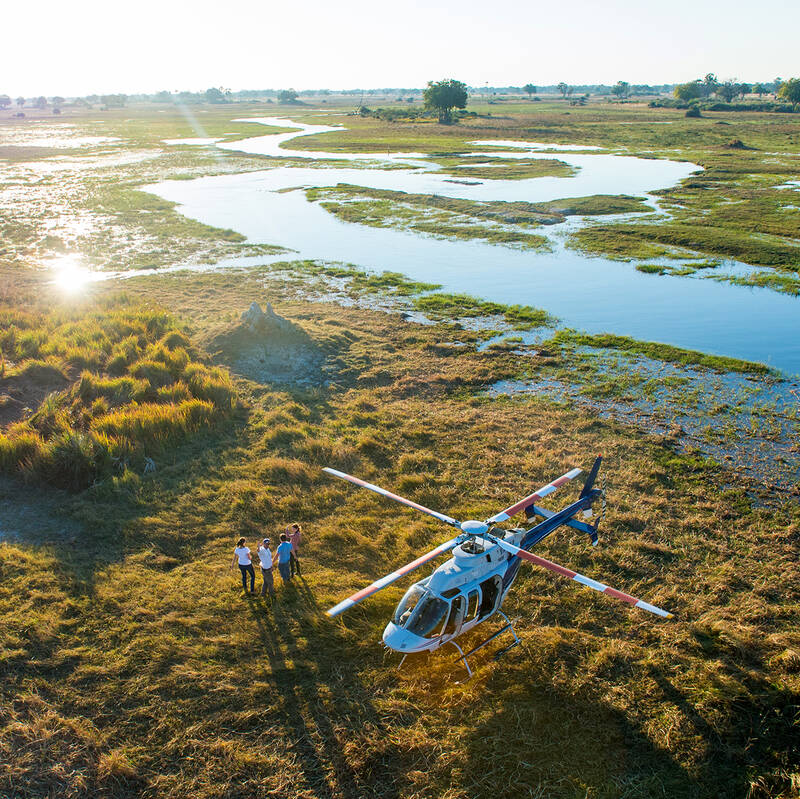
Helicopter Flight - Botswana
Various: from 30 minutes to half a day.
Low-flying, agile and offering superb views, helicopters are an ideal way to move around the Okavango Delta.You can use them instead of fixed-wing inter-lodge transfers or as an addition to other wildlife watching activities, and of course, helicopters can hover to allow that perfect pic, whereas fixed-wings can’t.
More about Helicopter FlightOther lodges in Kwando-Linyanti area
Alternative places to stay in this same area.
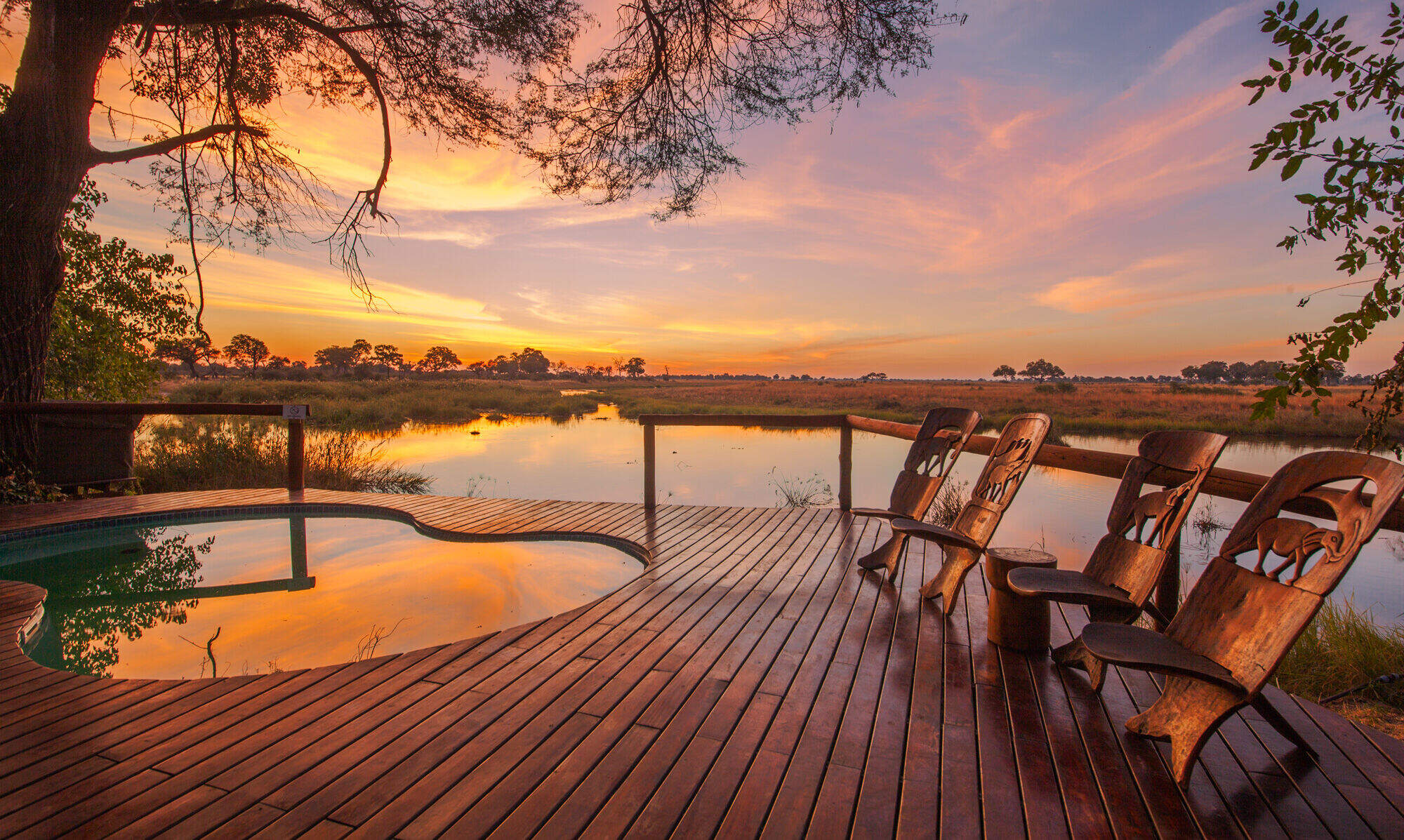
Lagoon Camp
Within the vast Kwando Reserve, renowned for its wild dogs, Lagoon Camp offers excellent game viewing that focuses on predators.
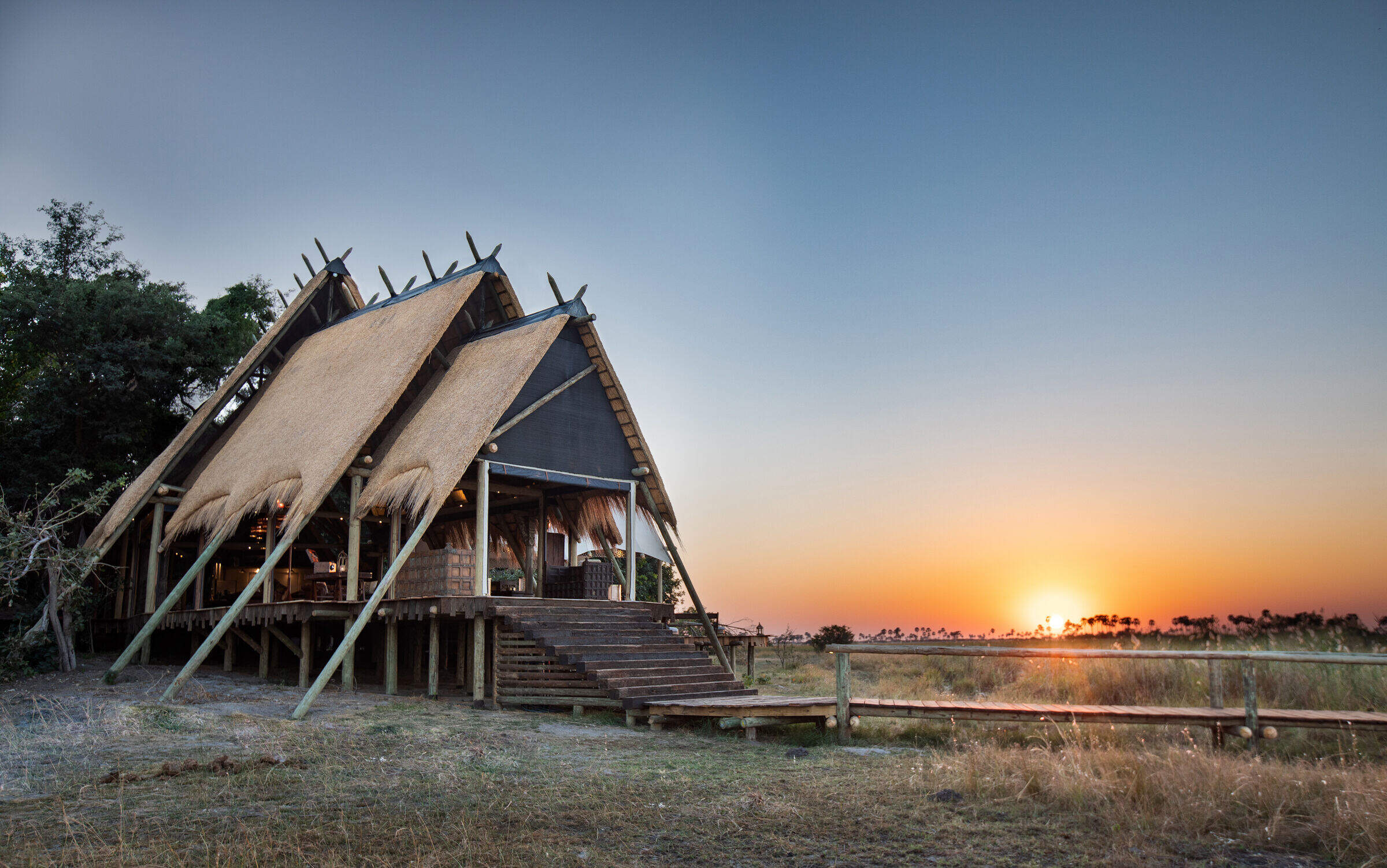
Selinda Camp
In an attractive area that is particularly rich in game between June and November, the luxurious Selinda Camp caters particularly well for photographers.
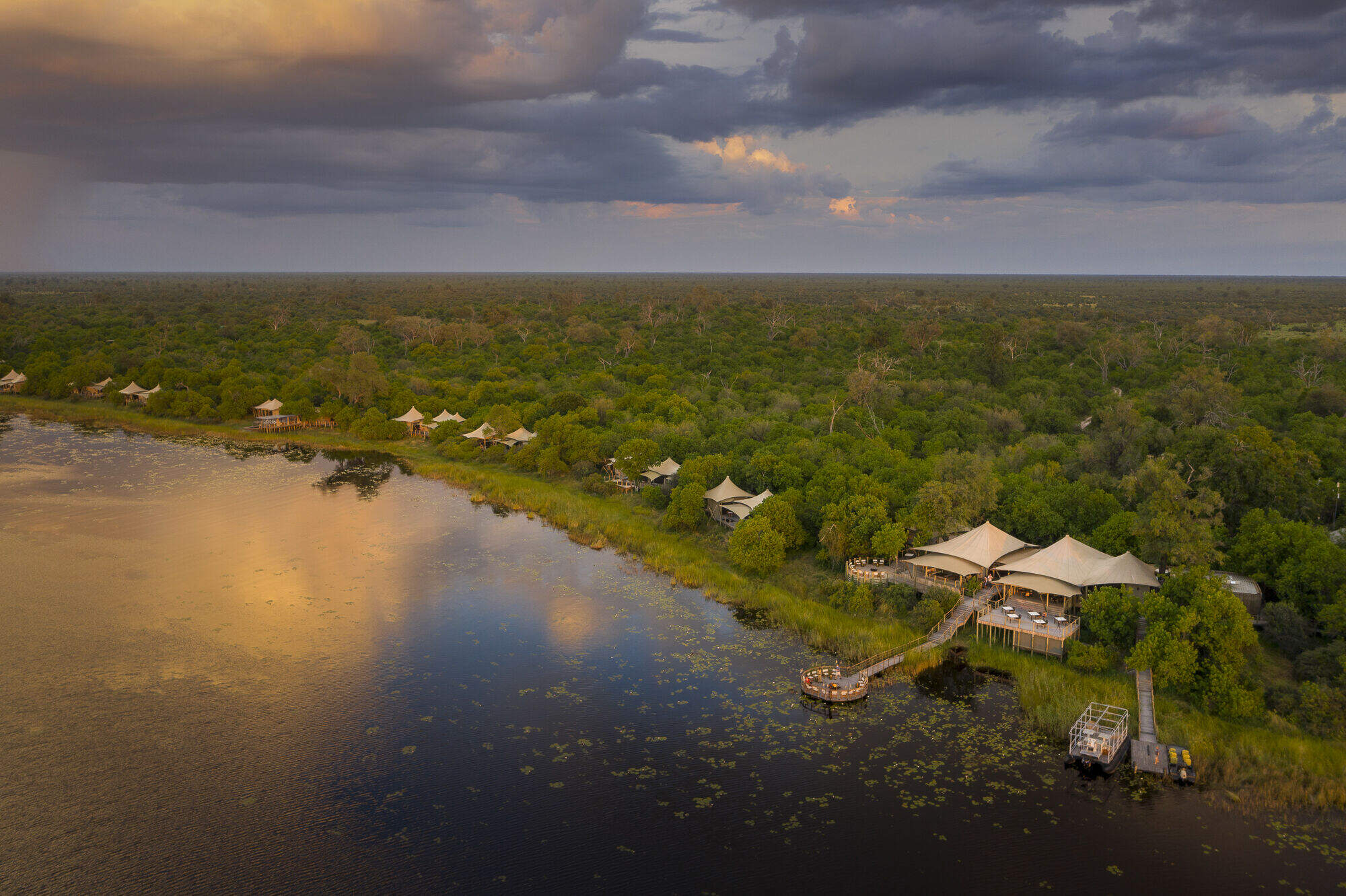
DumaTau
DumaTau, in the private Linyanti Reserve, offers game drives, seasonal boat cruises and walks. Wildlife safaris here are quite seasonal, and are at their best during the height of the dry season, between June and October.
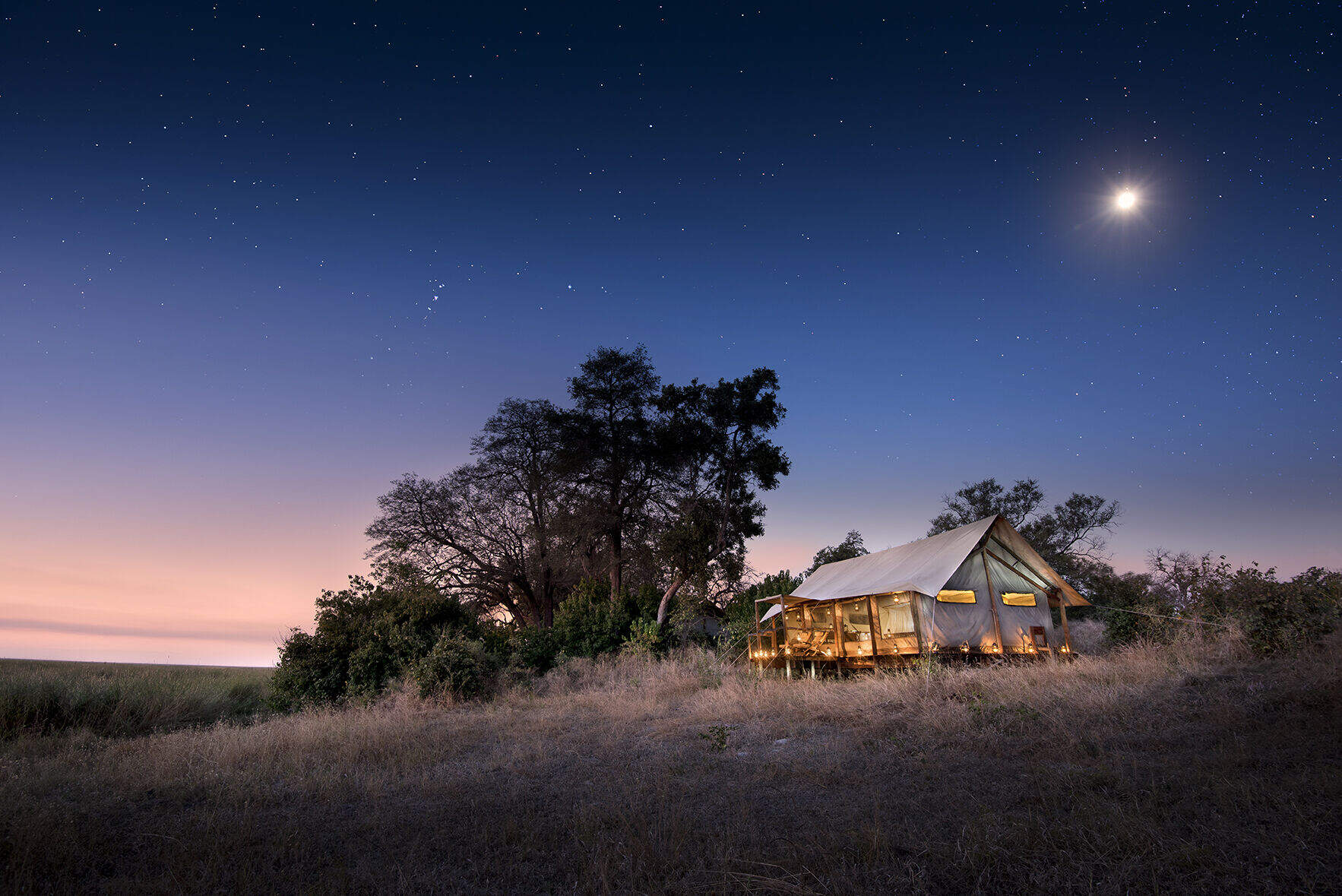
Linyanti Bush Camp
Linyanti Bush Camp blends relative simplicity with numerous activities and very good guiding.
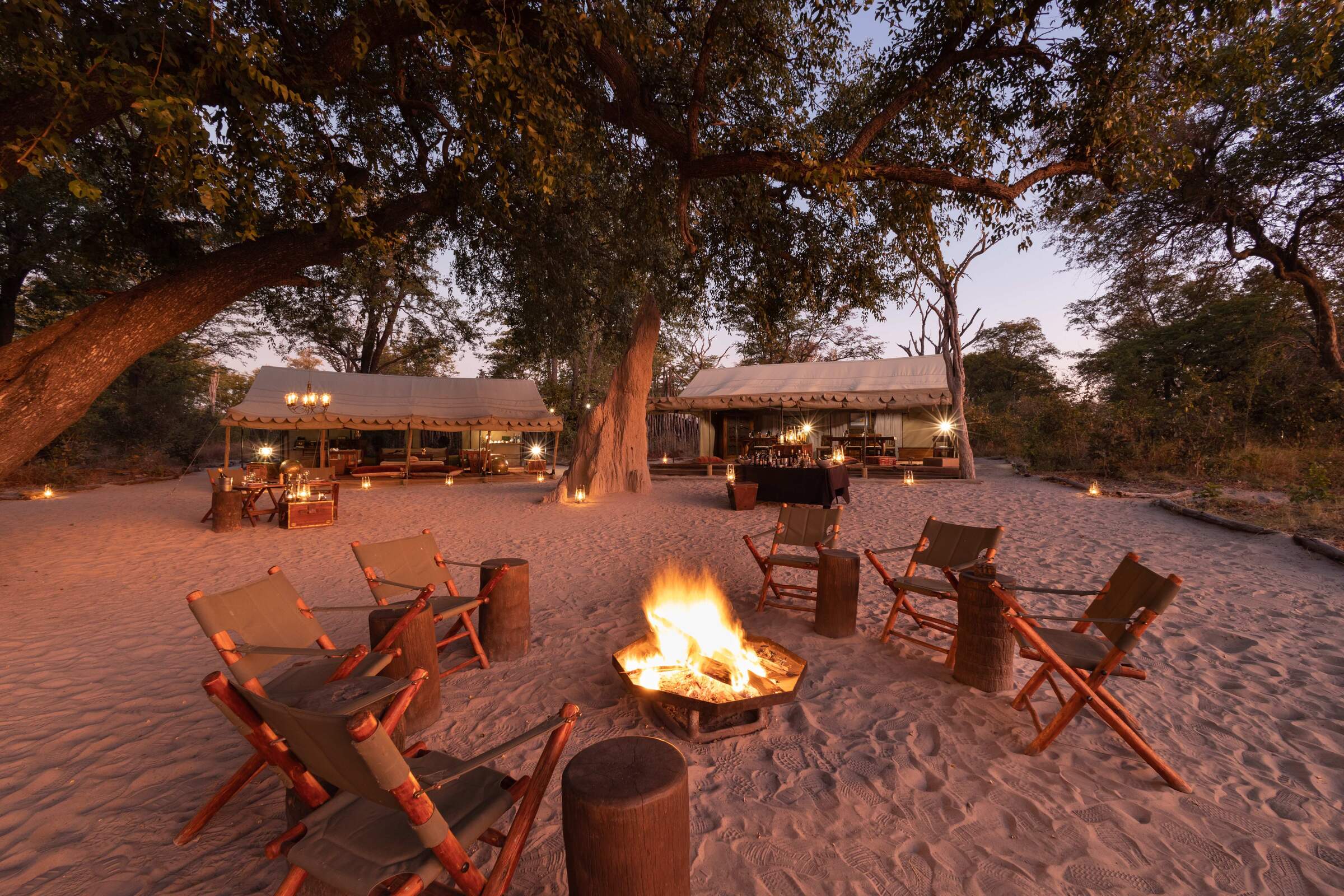
Selinda Explorers Camp
The luxurious, traditional tented Selinda Explorers Camp offers a mix of walking, canoeing and game drives led by really top notch guides in a game-rich area.
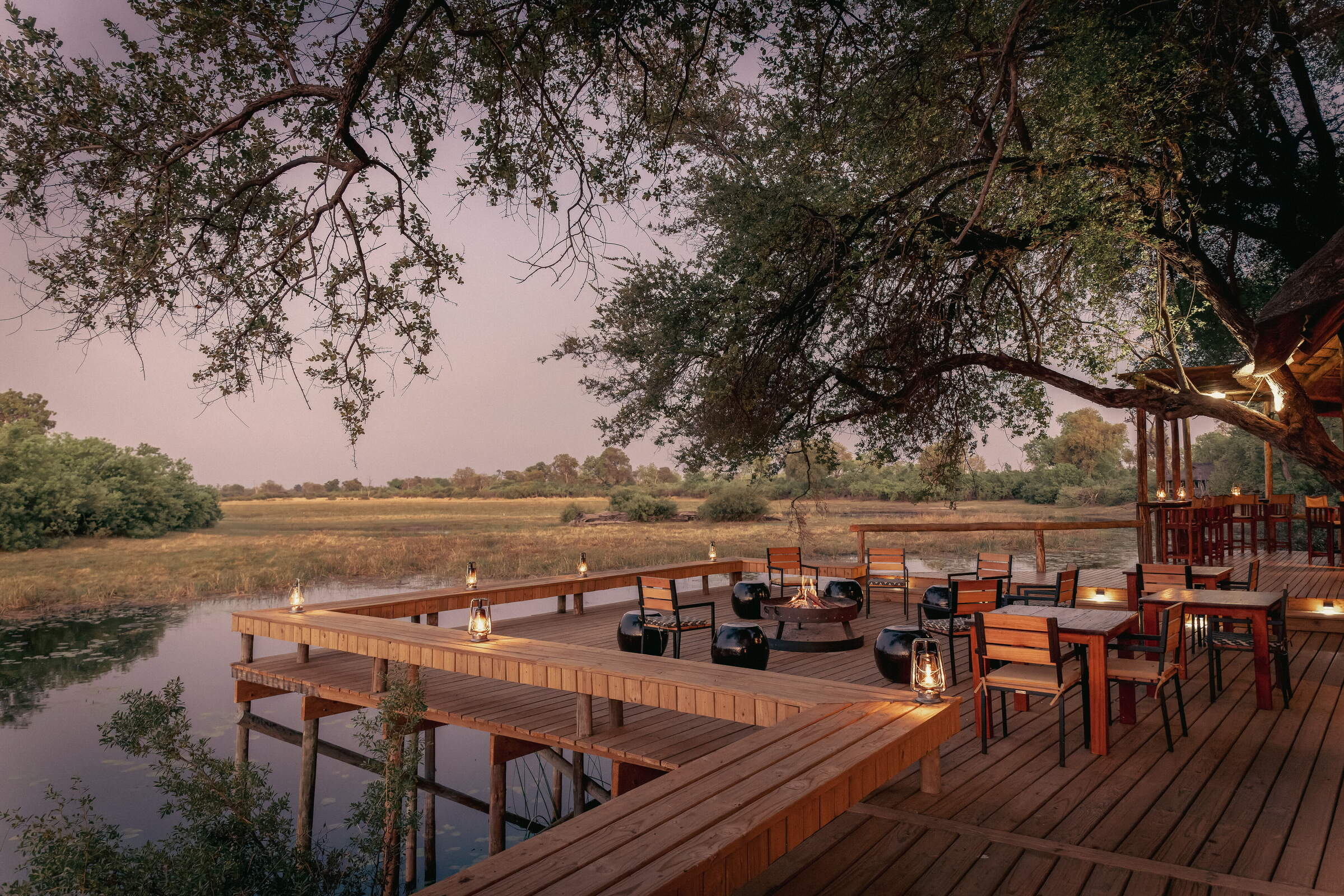
Savuti Camp
Set above the Savuti Channel, the refurbished seven-room Savuti Camp offers the potential for viewing large herds of elephant and significant lion encounters.
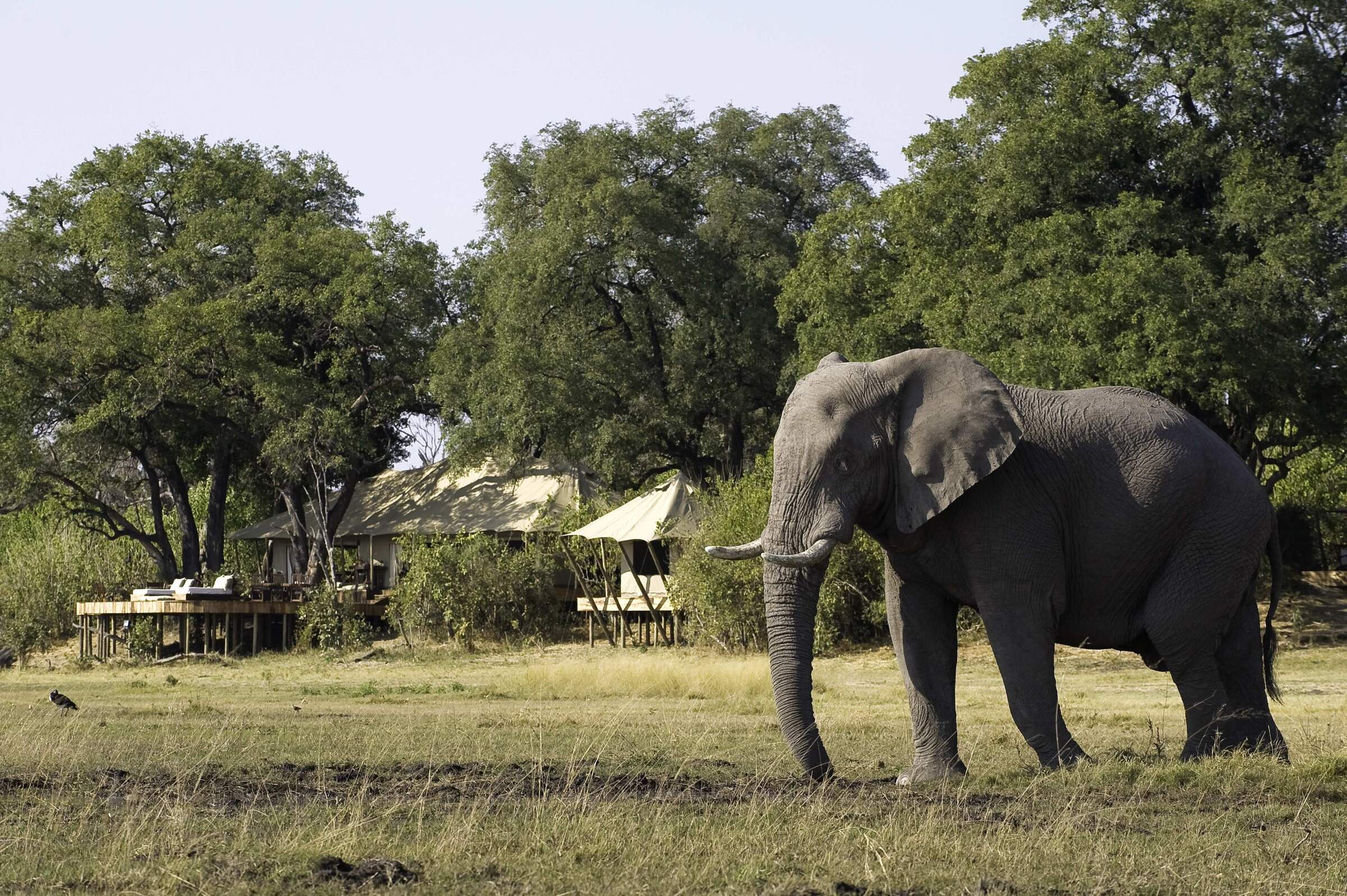
Zarafa Camp
Zarafa is an exclusive camp overlooking the scenic Zibadianja Lagoon within the Selinda Reserve, a particularly game-rich area between June and early November.
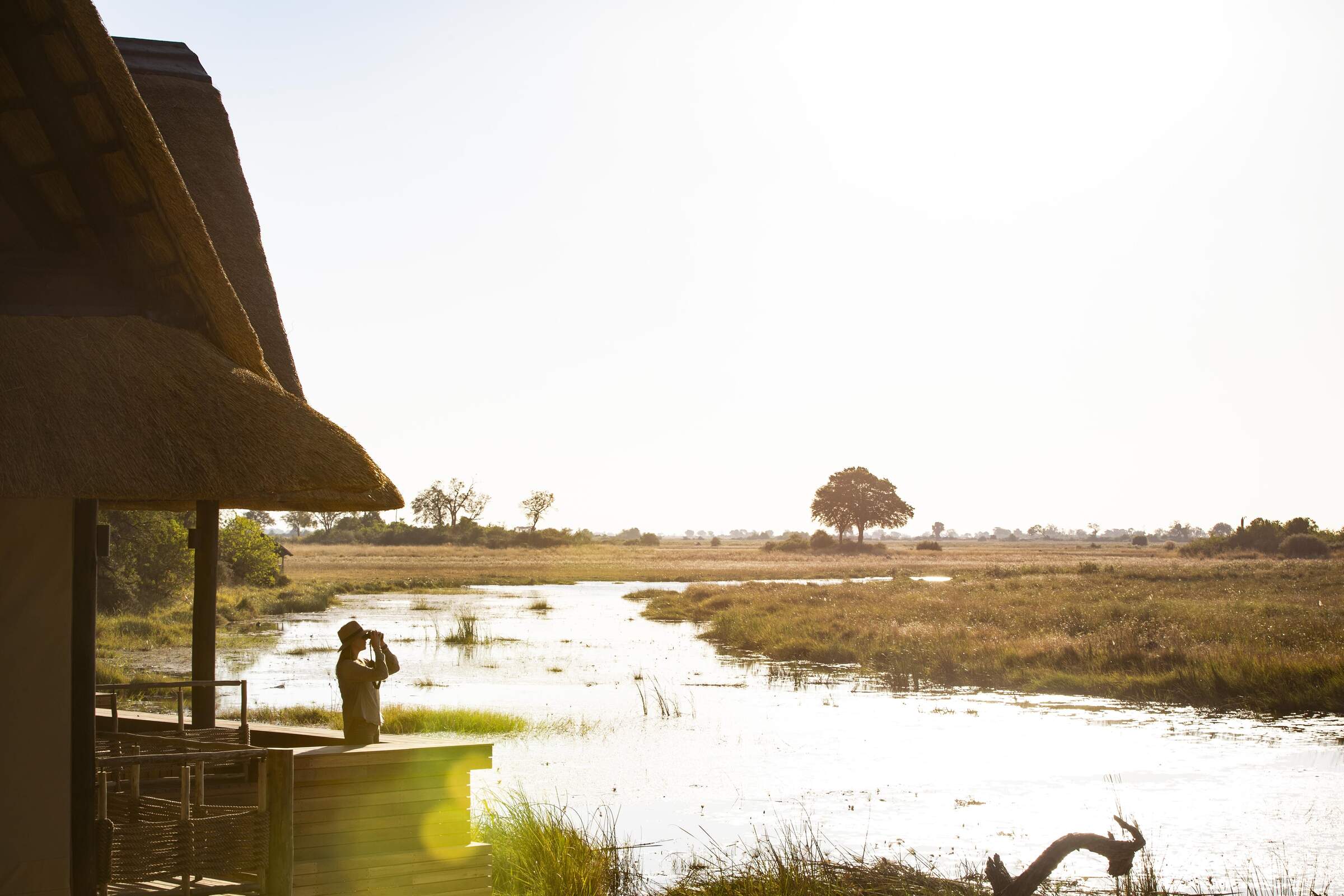
Kings Pool
King’s Pool is a top-end luxury safari camp with a price tag to match; the game viewing can be very good during the dry season.
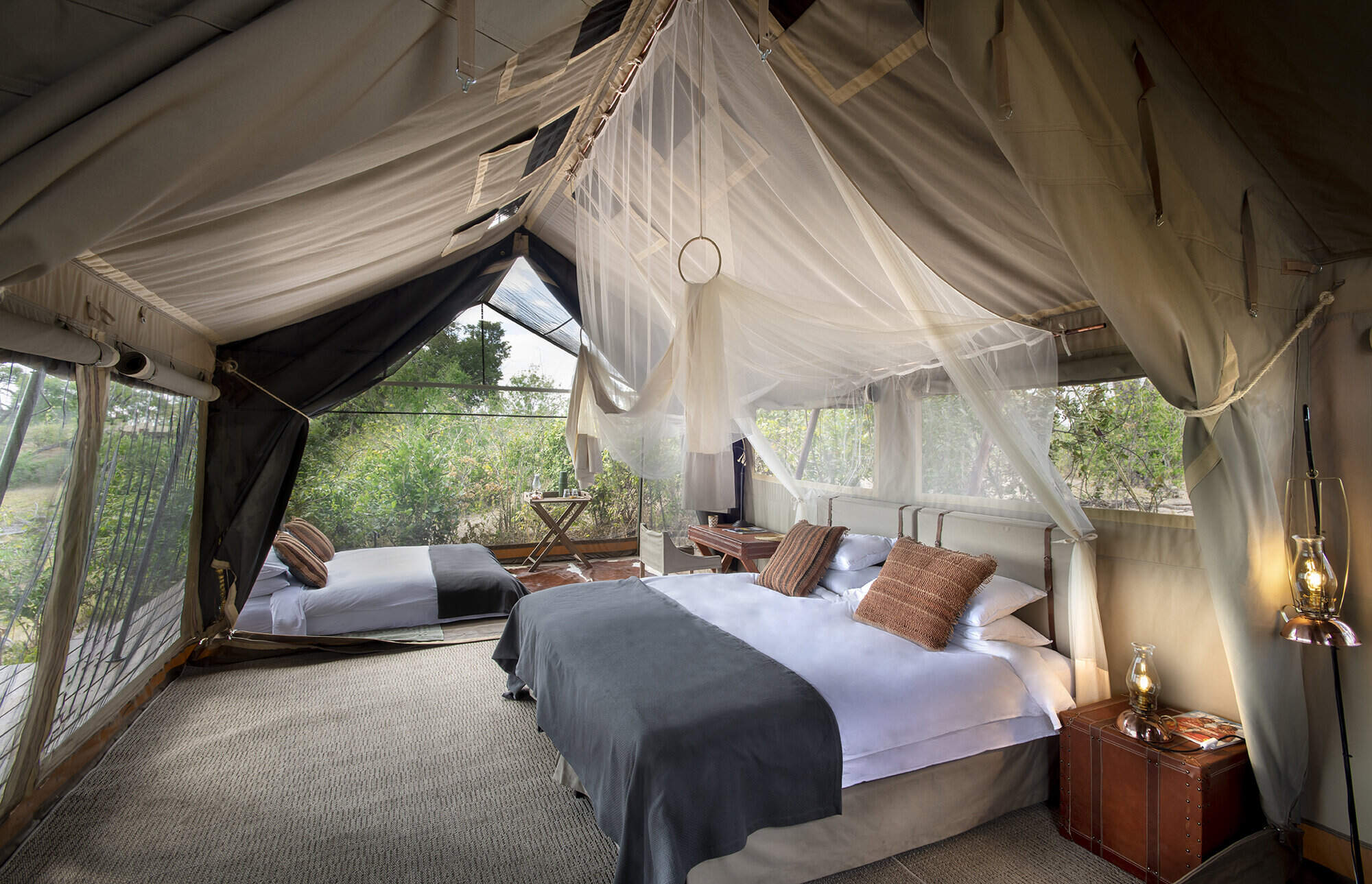
Linyanti Expeditions
Tip-top guiding. In tune with the habitat. Down-to-earth, authentic camp comfort. A place of wilderness safari harmony.
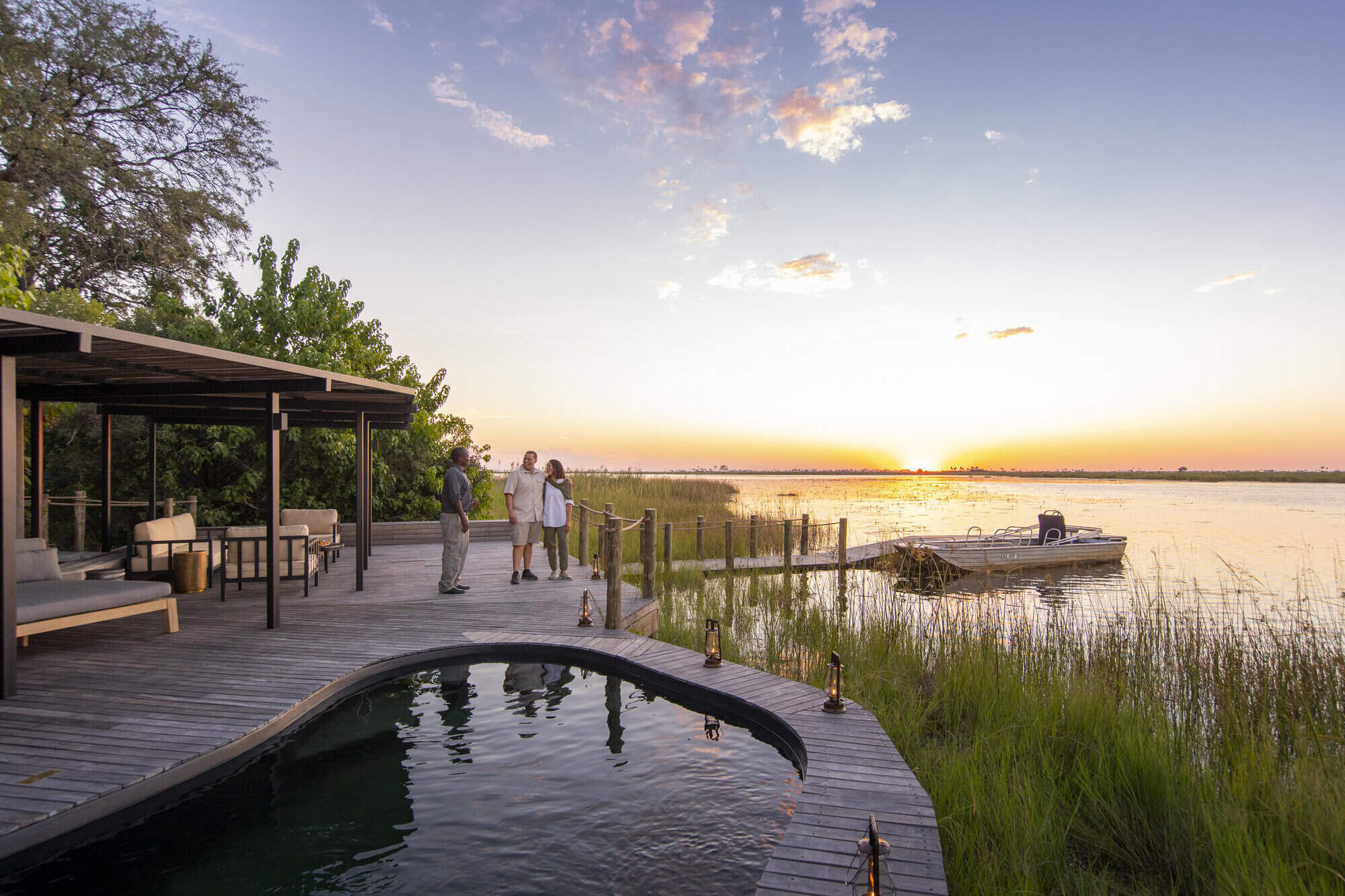
Little DumaTau
Small and sophisticated, Little DumaTau lies adjacent to its larger sibling in the private Linyanti Reserve, overlooking a beautiful lagoon.
When to go to Kwando-Linyanti area
Our month by month guide: What it's like to visit Lebala Camp in Kwando-Linyanti area
Jan
Feb
Mar
Apr
May
Jun
Jul
Aug
Sep
Oct
Nov
Dec
Kwando-Linyanti area in January
January marks the peak of the rainy season in the Kwando, Linyanti, and Selinda Reserves. Evening thunderstorms bring short but intense rains, cooling the air while temperatures remain warm. Wildlife disperses across the lush landscape due to the abundant water, making game viewing more challenging, though the southern and western parts of the Selinda Reserve still offer rewarding sightings.
The Kwando River and Linyanti floodplains attract water-loving species such as red lechwe, sitatunga, and waterbuck. Migratory birds thrive during this time, offering incredible birdwatching opportunities. The vibrant greenery creates stunning photography backdrops, and lower rates make January a great choice for budget-conscious travellers seeking a quieter, greener safari.
- Warm temperatures with occasional thunderstorms
- Spectacular birdlife, including migratory species
- Wildlife dispersed across lush floodplains
- Zebra and wildebeest migration in full swing
- Good availability at lodges and camps
Our view
A good time to visit, with pros & cons
Weather in January
Kwando-Linyanti area in February
February continues the rainy season with heavy rains and a humid atmosphere. The landscape is vibrant and teeming with life. Insects and smaller animals become more visible, while many species are raising their young, making for fascinating wildlife encounters. The Selinda Spillway and Zibadianja Lagoon are magnets for diverse wildlife during this time.
Thick vegetation and tall grasses can make it harder to spot larger animals, but water-based activities like boat cruises along the Kwando and Linyanti rivers offer superb birdwatching. The reserves’ papyrus reed-beds are home to elusive species like sitatunga, while buffalo and elephants frequent the floodplains. With fewer visitors, February is perfect for those looking for a more intimate safari experience.
- Warm with occasional thunderstorms
- Young animals abundant across the reserves
- Dispersed wildlife across the lush terrain
- Birds thriving, many in breeding plumage
- Excellent camp availability and low visitor numbers
Our view
This is not a great time to visit
Weather in February
Kwando-Linyanti area in March
March marks the tail end of the rainy season, with sunny days becoming more frequent and occasional afternoon thunderstorms still sweeping through. The landscape remains lush, with many animals finishing raising their young. Predators like lions and wild dogs are more active, taking advantage of plentiful prey.
Birdwatching is still rewarding, although some migratory species start to leave as the season progresses. The Kwando River and its channels provide excellent fishing and wildlife viewing opportunities. As the rains taper off, game drives become more productive, particularly in open areas of the reserves.
- Variable weather with clearer skies and rains decreasing
- Wildlife well-fed and thriving in lush surroundings
- Birdlife remains spectacular, though migrants begin to leave
- Lower rates and fewer visitors at camps
Our view
A good time to visit, with pros & cons
Weather in March
Kwando-Linyanti area in April
April is a transitional month in the Kwando, Linyanti, and Selinda Reserves, marking the shift from the wet to dry season. Rainfall becomes less frequent, giving way to clear skies and a verdant landscape. Night temperatures start to drop, especially in areas further from water.
As vegetation begins to thin, wildlife viewing improves, with increased predator-prey activity around water sources. The Selinda Spillway becomes a focal point for diverse wildlife, including elephants, buffalo, and various antelope species. Predator activity starts to become more visible, particularly around permanent water sources. Walking safaris and boat cruises offer unique ways to explore the ecosystem. With the shoulder season starting, April provides good value and a mix of lush scenery and growing wildlife activity.
- Cooler evenings with occasional light rain
- Selinda Spillway ideal for diverse wildlife sightings
- Good predator-prey interactions observable
- Excellent conditions for walking safaris and boat trips
- Shoulder season rates make this a popular month
Our view
A good time to visit, with pros & cons
Weather in April
Kwando-Linyanti area in May
May is one of the best months to visit the Kwando, Linyanti, and Selinda Reserves. With almost no rain, temperatures cool further in the mornings and evenings, increasing predator activity. Wildlife begins to concentrate around permanent water sources like the Linyanti and Kwando rivers, providing superb game viewing opportunities, especially of elephants and buffalo.
The Selinda Reserve’s diverse landscapes attract a variety of species, and walking safaris in the Kwando Reserve provide close-up wildlife encounters. Crisp, clear air enhances photography, capturing the vibrant wildlife and scenic beauty. May offers a balance of fantastic wildlife sightings, pleasant weather, and the final stretch of shoulder-season rates.
- Cool mornings and evenings, minimal rain
- Excellent predator activity and game viewing
- Crisp air perfect for photography
- Shoulder season rates - availability limited
Our view
A very good time to visit
Weather in May
Kwando-Linyanti area in June
June signals the start of the dry season, with cool mornings and evenings and warm, sunny days. The clear skies and thinning vegetation make this an excellent month for photography and wildlife viewing. As surface water dries up, animals gravitate to permanent water sources like the Kwando and Linyanti rivers, where predators are often seen stalking prey.
Game viewing excels in the Kwando-Linyanti areas, with improved visibility as vegetation thins, and the Selinda Spillway becomes a wildlife hotspot, attracting elephants, buffalo, and other species. Boat cruises provide a peaceful way to observe water-dependent wildlife, while night drives offer glimpses of nocturnal predators and other species. June’s popularity means high demand for camps, so early bookings are essential.
- Warm days, cold nights—ideal safari conditions
- Excellent conditions for wildlife photography
- Animals congregating around water sources
- Vegetation thinning, improving visibility
- Peak season begins with higher rates
Our view
Fantastic: the very best time to visit
Weather in June
Kwando-Linyanti area in July
July offers excellent game viewing conditions. Cool mornings and evenings are ideal for wildlife activity. The landscape is drier, concentrating animals around remaining water sources. The Kwando and Linyanti rivers become crucial for wildlife, attracting large herds of elephants and buffalo. Predator sightings increase, especially around waterholes. The Selinda Reserve's diverse habitats support a wide range of species, from big cats to rare antelopes.
It's one of the best months for walking safaris - cool and fresh in the mornings, with thinning vegetation enhancing visibility. Boat cruises provide serene views of the rivers and their surrounding wildlife. Night drives reveal fascinating nocturnal species, though temperatures can be chilly, so warm clothing is essential. July's popularity means camps are often fully booked, so early reservations are essential.
- Comfortable days, cold mornings and nights
- Excellent game viewing around waterholes and rivers
- Walking safaris and boat cruises highly recommended
- Peak season with camps often fully booked
Our view
Fantastic: the very best time to visit
Weather in July
Kwando-Linyanti area in August
August is a peak safari month, with warm days and cool nights offering comfortable conditions. Wildlife is highly concentrated around water sources, providing exceptional game viewing. The Selinda Spillway becomes a focal point for predators and prey, with frequent sightings of elephants, buffalo, and big cats.
Boat cruises along the Kwando and Linyanti rivers offer a unique perspective on the reserves’ wildlife, while clear skies make for incredible stargazing at night – but it’s cold so bring warm clothes, hats and gloves. August's popularity for northern hemisphere travellers means limited availability and higher rates at most camps.
- Dry, warm days with cool nights
- Wildlife activity peaks around water sources
- Okavango floods usually reach Selinda Spillway
- Super stargazing on clear nights
- High rates and limited availability in camps
Our view
Fantastic: the very best time to visit
Weather in August
Kwando-Linyanti area in September
September is a favourite for wildlife enthusiasts, with probably the best wildlife viewing of the year. Daytime temperatures are warming, but nights remain cool. The dry landscape concentrates wildlife around permanent water sources like the Kwando and Linyanti rivers, and along the Selinda Spillway. Large herds of elephants and buffalo are common on the floodplains, and predator sightings increase, with higher chances of witnessing dramatic hunting interactions.
The return of migratory birds like carmine bee-eaters adds a splash of colour to the reserves, enhancing birdwatching. The dry, hazy conditions create dramatic sunsets, while boat cruises and game drives offer rewarding, laid-back wildlife encounters. September’s popularity means high rates and limited availability at most camps, with early booking is essential.
- Warm days, cool nights—prime safari weather
- Exceptional wildlife viewing and predator activity
- Stunning sunsets and excellent birdwatching
- High season continues with limited availability
Our view
Fantastic: the very best time to visit
Weather in September
Kwando-Linyanti area in October
October is the hottest and driest month in these reserves, creating some of the most concentrated and dramatic wildlife sightings of the year. Animals gather around dwindling water sources, leading to intense predator-prey interactions. The Selinda Spillway becomes a lifeline for both herbivores and carnivores.
Boat cruises offer relief from the heat and a chance to observe water-dependent species. Migratory birds continue to arrive, adding vibrancy to the parched landscape. The clear, hazy conditions create spectacular photographic opportunities, particularly at sunset. Night drives are not nearly so cold and can reveal fascinating nocturnal activities. Despite the daytime heat, October remains a favourite for game viewing.
- Hot days, with chances of rain late in the month
- Outstanding big game sightings around limited water sources
- Excellent birdwatching with arriving migrants
- Water activities limited as floods recede
- Final month of peak season - high demand at camps
Our view
Fantastic: the very best time to visit
Weather in October
Kwando-Linyanti area in November
Sometime in November usually marks the start of the green season as temperatures and humidity rise, leading to the first dramatic thunderstorms. The landscape begins to transform, with fresh greenery spreading across the reserves. Wildlife starts to disperse as waterholes refill, but predator sightings remain good near permanent water sources. The Kwando and Linyanti rivers remain important for the large herds of elephants, and the Selinda Spillway continues to attract wildlife.
This is a fantastic time for birdwatching, with migratory species arriving in abundance. Where available, boat cruises highlight the changing environment, while game drives still offer rewarding wildlife encounters. Early November sees lower rates, making it a good choice for travellers seeking great game viewing at lower rates.
- Hot days with increasing humidity and dramatic thunderstorms
- Green season begins transforming landscape
- Wildlife viewing less predictable but rewarding near rivers
- Migratory birds arrive, enhancing birdwatching
- Shoulder season offers lower rates and good availability
Our view
A good time to visit, with pros & cons
Weather in November
Kwando-Linyanti area in December
December marks the height of the rainy season, bringing welcome relief from the high temperatures. While wildlife viewing becomes more challenging due to the dispersal of animals, skilled guides can still uncover remarkable sightings. The Kwando and Linyanti rivers remain vital habitats, and areas such as the Selinda Reserve offer rewarding game viewing, especially around Zibadianja Lagoon.
The landscape undergoes a dramatic transformation as fresh growth attracts herbivores. Migratory birds are plentiful, making this an excellent time for birdwatching. Although predator sightings are less frequent, they are often spectacular against the vibrant, lush scenery. Luxurious camps offer comfortable retreats during occasional rain showers, and lower-season rates make December an appealing choice for value-conscious travellers seeking a green-season safari.
- Warm with frequent rain storms
- Wildlife more dispersed across the reserves
- Green season in full effect, lush landscapes
- Low season rates make it a value-friendly option
Our view
A good time to visit, with pros & cons
Weather in December

Looking for inspiration on where to travel next?
Visit our trip chooser to explore your options and find inspiration for your perfect African adventure
Inspire me